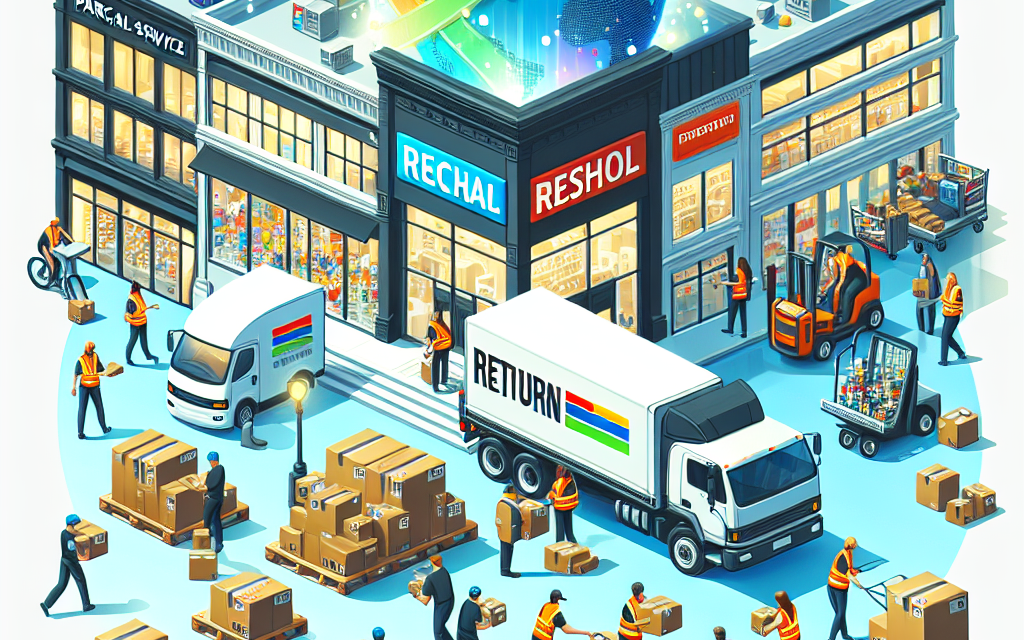“DHL: Streamlining Retail Returns for a Seamless Shopping Experience.”
Introduction
DHL has strategically entered the burgeoning retail returns sector, recognizing the increasing importance of efficient reverse logistics in the e-commerce landscape. As online shopping continues to surge, the volume of product returns has escalated, prompting retailers to seek reliable solutions for managing this complex process. By investing in the retail returns business, DHL aims to enhance its service offerings, streamline operations for retailers, and improve customer satisfaction. This move not only positions DHL as a key player in the logistics industry but also addresses the evolving needs of consumers and businesses in a rapidly changing market.
DHL’s Strategic Investment in Retail Returns
DHL, a global leader in logistics and supply chain management, has made a significant strategic investment in the burgeoning retail returns sector, recognizing the increasing importance of efficient returns processes in the e-commerce landscape. As online shopping continues to surge, driven by consumer demand for convenience and variety, the volume of product returns has also escalated, presenting both challenges and opportunities for retailers. In this context, DHL’s investment is not merely a financial maneuver; it reflects a comprehensive understanding of the evolving dynamics of retail and the critical role that returns play in customer satisfaction and brand loyalty.
The retail returns process has traditionally been viewed as a necessary inconvenience, often leading to increased operational costs and logistical complexities for retailers. However, DHL’s entry into this market signals a shift in perspective, as the company aims to transform returns from a burden into a streamlined, value-added service. By leveraging its extensive logistics network and expertise in supply chain management, DHL is poised to enhance the returns experience for both retailers and consumers. This strategic move aligns with the growing trend of omnichannel retailing, where seamless integration between online and offline shopping experiences is paramount.
Moreover, DHL’s investment is timely, as retailers are increasingly seeking innovative solutions to manage returns efficiently. The rise of fast fashion and the proliferation of online marketplaces have contributed to a culture of “try before you buy,” leading to higher return rates. In response, retailers are compelled to rethink their returns policies and processes, aiming to minimize costs while maximizing customer satisfaction. DHL’s capabilities in reverse logistics, which encompass the management of returned goods, can provide retailers with the tools necessary to navigate this complex landscape effectively.
In addition to operational efficiencies, DHL’s foray into the retail returns sector also emphasizes the importance of data analytics. By harnessing data from returns processes, DHL can offer valuable insights to retailers, enabling them to identify trends, understand customer behavior, and optimize inventory management. This data-driven approach not only enhances the returns process but also empowers retailers to make informed decisions that can lead to improved product offerings and customer experiences. As such, DHL’s investment is not just about logistics; it is about creating a comprehensive ecosystem that supports retailers in adapting to the fast-paced changes in consumer preferences.
Furthermore, the environmental implications of retail returns cannot be overlooked. As sustainability becomes a critical concern for consumers and businesses alike, DHL’s investment in this sector also reflects a commitment to reducing the carbon footprint associated with returns. By implementing more efficient logistics solutions and promoting circular economy practices, DHL can help retailers minimize waste and enhance their sustainability initiatives. This alignment with environmental goals not only meets consumer expectations but also positions DHL as a forward-thinking leader in the logistics industry.
In conclusion, DHL’s strategic investment in the retail returns business is a forward-looking initiative that addresses the complexities of modern e-commerce. By transforming returns into a streamlined process, leveraging data analytics, and promoting sustainability, DHL is not only enhancing its service offerings but also supporting retailers in navigating the challenges of a rapidly changing market. As the retail landscape continues to evolve, DHL’s commitment to innovation and efficiency in the returns sector will undoubtedly play a pivotal role in shaping the future of logistics and retail.
The Impact of E-commerce Growth on Retail Returns
The rapid expansion of e-commerce has fundamentally transformed the retail landscape, leading to significant changes in consumer behavior and expectations. As online shopping continues to gain traction, the volume of retail returns has surged, presenting both challenges and opportunities for businesses. This phenomenon is particularly pronounced in sectors such as fashion, electronics, and home goods, where the inability to physically inspect products before purchase often results in higher return rates. Consequently, retailers are increasingly compelled to develop robust return policies and efficient logistics solutions to accommodate this growing trend.
One of the most notable impacts of e-commerce growth on retail returns is the shift in consumer expectations regarding return processes. Today’s shoppers demand convenience and flexibility, often seeking hassle-free return options that allow them to send back items with minimal effort. This shift has prompted retailers to rethink their return strategies, emphasizing the importance of user-friendly return portals, clear communication, and accessible drop-off locations. As a result, businesses that prioritize seamless return experiences are likely to foster customer loyalty and enhance their competitive edge in an increasingly crowded marketplace.
Moreover, the financial implications of retail returns cannot be overlooked. The costs associated with processing returns, including shipping, restocking, and potential markdowns on returned items, can significantly impact a retailer’s bottom line. In fact, studies indicate that returns can account for a substantial percentage of total sales, particularly in the e-commerce sector. Therefore, retailers are now more than ever focused on optimizing their return processes to mitigate these costs. This includes leveraging data analytics to identify patterns in return behavior, which can inform inventory management and product development strategies. By understanding the reasons behind returns, retailers can make informed decisions that not only reduce return rates but also enhance overall customer satisfaction.
In addition to operational challenges, the rise of e-commerce returns has also prompted discussions around sustainability. As consumers become increasingly aware of environmental issues, the carbon footprint associated with return shipping and processing has come under scrutiny. Retailers are now tasked with balancing the need for efficient return processes with the growing demand for sustainable practices. This has led to innovative solutions, such as encouraging customers to return items to physical stores rather than shipping them back, thereby reducing transportation emissions. Furthermore, some companies are exploring options for refurbishing or recycling returned products, which not only minimizes waste but also aligns with the values of environmentally conscious consumers.
As the e-commerce landscape continues to evolve, the importance of effective return management will only increase. Retailers must remain agile, adapting their strategies to meet the changing needs of consumers while also addressing the financial and environmental implications of returns. In this context, partnerships with logistics providers, such as DHL, can play a crucial role in streamlining return processes and enhancing operational efficiency. By investing in advanced logistics solutions, retailers can ensure that they are well-equipped to handle the complexities of retail returns in a rapidly changing market.
In conclusion, the growth of e-commerce has had a profound impact on retail returns, reshaping consumer expectations and challenging businesses to rethink their return strategies. As retailers navigate this evolving landscape, the ability to manage returns effectively will be essential for maintaining customer satisfaction and achieving long-term success. By embracing innovative solutions and prioritizing sustainability, businesses can turn the challenges of retail returns into opportunities for growth and differentiation in an increasingly competitive environment.
How DHL is Transforming the Returns Process
DHL, a global leader in logistics and supply chain management, is making significant strides in the retail returns sector, a segment that has gained increasing importance in the e-commerce landscape. As online shopping continues to flourish, the volume of returns has surged, prompting retailers to seek efficient solutions to manage this complex process. Recognizing the challenges posed by high return rates, DHL is transforming the returns process by leveraging its extensive logistics network and innovative technology.
One of the primary ways DHL is enhancing the returns experience is through the implementation of streamlined logistics solutions. By optimizing the reverse logistics chain, DHL ensures that returned items are processed quickly and efficiently. This not only minimizes the time products spend in transit but also reduces costs for retailers. The company’s advanced tracking systems allow both retailers and customers to monitor the status of returns in real-time, providing transparency and peace of mind. This level of visibility is crucial in an era where consumers expect prompt resolutions and clear communication regarding their purchases.
Moreover, DHL is investing in technology to further refine the returns process. The integration of artificial intelligence and data analytics enables the company to predict return patterns and identify potential issues before they escalate. By analyzing historical data, DHL can offer retailers insights into which products are most likely to be returned, allowing them to make informed decisions about inventory management and product design. This proactive approach not only helps retailers reduce return rates but also enhances customer satisfaction by addressing potential concerns before they arise.
In addition to technological advancements, DHL is also focusing on improving the customer experience during the returns process. The company has developed user-friendly return portals that simplify the initiation of returns for consumers. These portals guide customers through the return process, providing clear instructions and options for shipping. By making the returns process as seamless as possible, DHL is helping retailers foster customer loyalty, as satisfied customers are more likely to make repeat purchases.
Furthermore, DHL is expanding its network of return drop-off locations, making it more convenient for customers to return items. By partnering with local businesses and establishing return points in easily accessible areas, DHL is reducing the barriers associated with returning products. This initiative not only enhances the customer experience but also supports local economies by driving foot traffic to partner businesses.
As sustainability becomes an increasingly pressing concern for consumers and businesses alike, DHL is also committed to making the returns process more environmentally friendly. The company is exploring eco-friendly packaging solutions and optimizing transportation routes to minimize carbon emissions associated with returns. By prioritizing sustainability, DHL is not only addressing consumer preferences but also positioning itself as a responsible leader in the logistics industry.
In conclusion, DHL’s strategic investments in technology, customer experience, and sustainability are transforming the retail returns process. By streamlining logistics, enhancing visibility, and prioritizing convenience, DHL is setting new standards for how returns are managed in the e-commerce sector. As the retail landscape continues to evolve, DHL’s innovative approach will undoubtedly play a pivotal role in shaping the future of returns, ensuring that both retailers and consumers benefit from a more efficient and effective process. Through these efforts, DHL is not only addressing the challenges of today but also paving the way for a more sustainable and customer-centric returns experience in the years to come.
Benefits of Efficient Returns Management for Retailers
In the rapidly evolving landscape of e-commerce, efficient returns management has emerged as a critical component for retailers aiming to enhance customer satisfaction and streamline operations. As online shopping continues to gain traction, the volume of product returns has surged, necessitating a robust strategy to handle these transactions effectively. Retailers that prioritize efficient returns management not only improve their operational efficiency but also foster customer loyalty, ultimately driving sales and profitability.
One of the primary benefits of efficient returns management is the enhancement of customer experience. In an era where consumers expect seamless interactions, a straightforward and hassle-free return process can significantly influence their purchasing decisions. When retailers implement user-friendly return policies, such as easy-to-print return labels and flexible return windows, they create a positive shopping experience that encourages repeat business. Customers are more likely to return to a retailer that handles returns with transparency and ease, knowing that they can shop with confidence, even if the product does not meet their expectations.
Moreover, efficient returns management can lead to cost savings for retailers. By optimizing the returns process, businesses can reduce the operational costs associated with handling returns, such as shipping, restocking, and inventory management. For instance, utilizing data analytics to track return patterns can help retailers identify the most common reasons for returns, allowing them to address product quality issues or improve sizing information. By proactively managing these factors, retailers can minimize the volume of returns, thereby reducing associated costs and enhancing overall profitability.
In addition to cost savings, effective returns management can also provide valuable insights into customer behavior and preferences. By analyzing return data, retailers can gain a deeper understanding of their customers’ needs and expectations. This information can be instrumental in refining product offerings, improving marketing strategies, and tailoring the overall shopping experience. For example, if a particular product consistently generates high return rates due to sizing issues, retailers can adjust their sizing charts or provide more detailed product descriptions to mitigate future returns. This data-driven approach not only enhances product quality but also strengthens the retailer’s brand reputation.
Furthermore, efficient returns management can serve as a competitive differentiator in the crowded retail market. As consumers become increasingly discerning, retailers that offer superior returns experiences can set themselves apart from competitors. A well-structured returns policy can be a powerful marketing tool, attracting customers who prioritize flexibility and convenience. Retailers that communicate their commitment to hassle-free returns are likely to capture a larger share of the market, as consumers gravitate towards brands that prioritize their needs.
Lastly, the integration of technology into returns management processes can further enhance efficiency and effectiveness. Automation tools, such as return management software, can streamline the entire returns process, from initiation to resolution. These technologies not only reduce the administrative burden on staff but also provide real-time tracking and reporting capabilities, enabling retailers to monitor returns performance and make informed decisions. By leveraging technology, retailers can create a more agile and responsive returns process that meets the demands of today’s consumers.
In conclusion, the benefits of efficient returns management for retailers are multifaceted, encompassing improved customer experience, cost savings, valuable insights, competitive differentiation, and technological integration. As the retail landscape continues to evolve, those who invest in optimizing their returns processes will be well-positioned to thrive in an increasingly competitive environment. By recognizing the importance of returns management, retailers can turn potential challenges into opportunities for growth and success.
The Role of Technology in DHL’s Returns Solutions
In the rapidly evolving landscape of e-commerce, the management of retail returns has emerged as a critical component of customer satisfaction and operational efficiency. Recognizing this trend, DHL has strategically invested in enhancing its returns solutions, leveraging advanced technology to streamline processes and improve the overall customer experience. The integration of technology into DHL’s returns solutions not only facilitates smoother operations but also addresses the growing demands of consumers who expect hassle-free return processes.
One of the primary technological advancements that DHL has adopted is the use of data analytics. By harnessing the power of big data, DHL can gain valuable insights into return patterns and customer behavior. This information allows the company to identify common reasons for returns, enabling retailers to make informed decisions about product quality and inventory management. Furthermore, data analytics can help DHL optimize its logistics network, ensuring that returned items are processed and restocked efficiently. This proactive approach not only reduces operational costs but also enhances the speed at which customers receive refunds or exchanges, thereby improving overall satisfaction.
In addition to data analytics, DHL has embraced automation as a key element of its returns solutions. Automated systems can significantly reduce the time and labor required to process returns, allowing for a more efficient workflow. For instance, automated sorting systems can quickly categorize returned items based on their condition and resale potential, streamlining the process of reintegrating products into inventory. This not only minimizes the risk of human error but also accelerates the turnaround time for returned goods, ensuring that retailers can quickly restock popular items and maintain optimal inventory levels.
Moreover, the implementation of mobile technology has transformed the way customers initiate returns. DHL has developed user-friendly mobile applications that allow consumers to easily generate return labels, track the status of their returns, and receive notifications throughout the process. This level of transparency is crucial in building trust with customers, as they are kept informed every step of the way. By simplifying the return process through mobile technology, DHL enhances the overall customer experience, making it more likely that consumers will continue to shop with retailers who utilize their services.
Furthermore, DHL’s investment in artificial intelligence (AI) is paving the way for even more sophisticated returns solutions. AI algorithms can analyze vast amounts of data to predict return trends and optimize inventory management. By anticipating which products are likely to be returned, retailers can adjust their purchasing strategies accordingly, reducing excess inventory and minimizing losses. Additionally, AI can enhance customer service by providing personalized recommendations based on previous purchases and return history, further improving the shopping experience.
As the retail landscape continues to evolve, the role of technology in DHL’s returns solutions will only become more significant. By embracing innovations such as data analytics, automation, mobile technology, and artificial intelligence, DHL is not only enhancing its operational efficiency but also positioning itself as a leader in the returns management sector. This commitment to leveraging technology ensures that DHL can meet the growing demands of e-commerce while providing exceptional service to both retailers and consumers. Ultimately, as the returns process becomes increasingly complex, DHL’s technological advancements will play a pivotal role in shaping the future of retail returns, fostering a seamless experience that benefits all stakeholders involved.
Consumer Expectations and the Future of Returns
As e-commerce continues to flourish, consumer expectations regarding returns have evolved significantly, prompting logistics companies to adapt their strategies to meet these demands. The rise of online shopping has not only transformed purchasing habits but has also reshaped the way consumers perceive the returns process. Today’s shoppers expect a seamless, hassle-free experience when returning products, which has become a critical factor in their overall satisfaction and loyalty to brands. This shift in consumer behavior has led to an increased focus on the efficiency and effectiveness of return logistics, compelling companies like DHL to invest in this burgeoning sector.
The growing importance of returns in the retail landscape cannot be overstated. Research indicates that a significant percentage of online purchases are returned, with estimates suggesting that returns can account for as much as 30% of total sales in certain categories. This statistic underscores the necessity for retailers to not only facilitate easy returns but also to manage them efficiently. As a result, logistics providers are recognizing the potential for growth in the returns business, prompting strategic investments aimed at enhancing their capabilities in this area. DHL’s recent foray into the retail returns market exemplifies this trend, as the company seeks to capitalize on the increasing demand for streamlined return processes.
Moreover, consumer expectations have shifted towards transparency and speed in the returns process. Shoppers now anticipate clear communication regarding return policies, tracking information, and timely refunds. This demand for transparency has led retailers to reevaluate their return policies, often opting for more lenient terms to attract and retain customers. In this context, logistics companies play a pivotal role in ensuring that returns are processed swiftly and accurately, thereby enhancing the overall customer experience. DHL’s investment in the returns sector is a strategic move to align with these evolving consumer expectations, positioning the company as a leader in providing efficient return solutions.
In addition to speed and transparency, sustainability has emerged as a key consideration for consumers when it comes to returns. As awareness of environmental issues grows, shoppers are increasingly concerned about the ecological impact of their purchasing decisions, including the carbon footprint associated with returns. This has prompted retailers and logistics providers to explore more sustainable practices in their return processes. DHL, recognizing this trend, is likely to incorporate eco-friendly initiatives into its returns strategy, such as optimizing transportation routes and utilizing sustainable packaging materials. By addressing these environmental concerns, DHL can not only meet consumer expectations but also contribute to broader sustainability goals.
Looking ahead, the future of returns in the retail sector will undoubtedly be shaped by technological advancements. Innovations such as artificial intelligence, machine learning, and data analytics are poised to revolutionize the returns process, enabling companies to predict return patterns, optimize inventory management, and enhance customer service. As logistics providers like DHL embrace these technologies, they will be better equipped to respond to the dynamic needs of consumers, ultimately driving growth in the returns business.
In conclusion, the evolving landscape of consumer expectations surrounding returns presents both challenges and opportunities for logistics companies. As e-commerce continues to expand, the demand for efficient, transparent, and sustainable return processes will only intensify. DHL’s strategic investment in the retail returns sector reflects a keen understanding of these trends, positioning the company to thrive in a competitive market. By prioritizing consumer needs and leveraging technological advancements, DHL is well-positioned to lead the way in shaping the future of returns in the retail industry.
Case Studies: Successful Retail Returns Implementations by DHL
DHL’s strategic investment in the retail returns sector reflects a growing recognition of the importance of efficient reverse logistics in the e-commerce landscape. As online shopping continues to surge, the volume of returns has escalated, prompting retailers to seek innovative solutions to manage this complex process. DHL has successfully implemented various case studies that illustrate its capability to streamline retail returns, enhancing customer satisfaction while optimizing operational efficiency.
One notable example is DHL’s collaboration with a leading fashion retailer. Faced with a high return rate due to the nature of apparel purchases, the retailer sought DHL’s expertise to refine its returns process. By leveraging DHL’s advanced logistics network, the retailer was able to establish a seamless returns experience for customers. DHL implemented a user-friendly returns portal, allowing customers to initiate returns with ease. This initiative not only improved customer satisfaction but also reduced the time taken to process returns, enabling the retailer to restock items more quickly and minimize losses associated with unsold inventory.
In another case, DHL partnered with a major electronics retailer that struggled with the complexities of handling returns for high-value items. The retailer faced challenges related to product condition assessments and the need for efficient refurbishment processes. DHL introduced a specialized returns management system that included a thorough inspection and testing protocol for returned electronics. This system ensured that products were either restocked or refurbished efficiently, thereby maximizing the retailer’s recovery on returned items. The implementation of this tailored solution not only improved the retailer’s bottom line but also enhanced customer trust, as consumers felt more confident in their purchases knowing that returns would be handled professionally.
Moreover, DHL’s investment in technology has played a pivotal role in optimizing retail returns. In a case involving a global home goods retailer, DHL utilized data analytics to identify patterns in return reasons. By analyzing this data, the retailer was able to make informed decisions regarding product design and inventory management. For instance, if a particular item was frequently returned due to sizing issues, the retailer could adjust its sizing charts or provide more detailed product descriptions. This proactive approach not only reduced return rates but also fostered a more positive shopping experience for customers.
Additionally, DHL has demonstrated its commitment to sustainability in the retail returns process. In collaboration with a prominent outdoor gear retailer, DHL implemented a program focused on reducing the environmental impact of returns. This initiative included the use of eco-friendly packaging materials and optimized transportation routes to minimize carbon emissions. By promoting sustainable practices, DHL not only helped the retailer enhance its corporate social responsibility profile but also appealed to environmentally conscious consumers, thereby strengthening brand loyalty.
In conclusion, DHL’s foray into the retail returns business has yielded significant benefits for its partners, showcasing the company’s ability to address the unique challenges of reverse logistics. Through successful case studies, DHL has demonstrated that by leveraging technology, data analytics, and sustainable practices, it can transform the returns process into a competitive advantage for retailers. As e-commerce continues to evolve, DHL’s innovative solutions will undoubtedly play a crucial role in shaping the future of retail returns, ensuring that both retailers and consumers can navigate this complex landscape with greater ease and efficiency.
Q&A
1. **What recent move has DHL made in the retail returns sector?**
DHL has invested in expanding its capabilities in the retail returns business to enhance logistics solutions for e-commerce.
2. **Why is the retail returns business significant for DHL?**
The retail returns business is significant due to the increasing volume of online shopping, which leads to higher return rates, necessitating efficient logistics solutions.
3. **How does DHL plan to improve its retail returns services?**
DHL plans to improve its retail returns services by integrating technology and optimizing its logistics network to streamline the returns process for retailers and consumers.
4. **What are the benefits for retailers partnering with DHL for returns?**
Retailers can benefit from faster processing times, improved customer satisfaction, and reduced costs associated with handling returns.
5. **What challenges does DHL face in the retail returns market?**
DHL faces challenges such as managing the complexity of reverse logistics, maintaining cost efficiency, and adapting to varying return policies across different retailers.
6. **How does the growth of e-commerce impact DHL’s strategy?**
The growth of e-commerce drives DHL to enhance its logistics capabilities, particularly in handling returns, to meet the demands of online retailers and their customers.
7. **What future trends might influence DHL’s operations in the retail returns sector?**
Future trends may include increased automation, the use of artificial intelligence for processing returns, and a greater emphasis on sustainability in logistics practices.
Conclusion
DHL’s investment in the retail returns business positions the company to capitalize on the increasing demand for efficient logistics solutions in e-commerce. By enhancing its capabilities in managing returns, DHL aims to improve customer satisfaction and streamline operations for retailers, ultimately strengthening its market presence in a competitive landscape. This strategic move reflects the growing importance of returns management in the retail sector, driven by the rise of online shopping and consumer expectations for hassle-free return processes.





